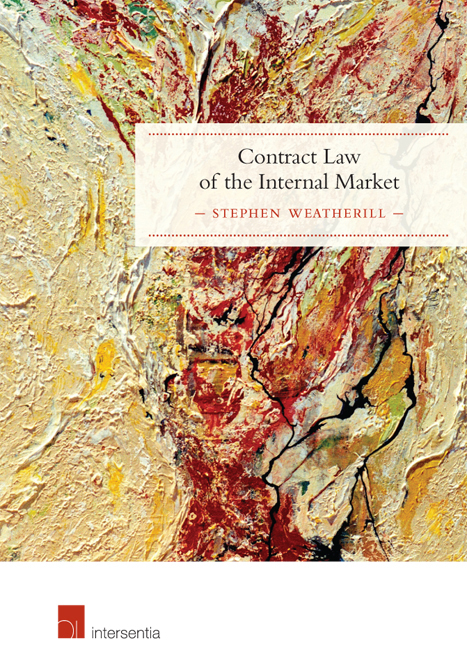Book contents
- Frontmatter
- Preface
- Contents
- Table of Cases: Alphabetical
- Table of Cases: Chronological
- Chapter 1 The Landscape of Contract Law in the EU
- Chapter 2 Contractual Autonomy and National Contract Law in the Internal Market
- Chapter 3 The EU as a Source of Contract Law
- Chapter 4 Themes and Principles in the EU's Contract Law Acquis
- Chapter 5 Improving the Regulatory Environment
- Chapter 6 Models of Harmonisation: Maximum or Minimum
- Chapter 7 Measuring the Effects of the Contract Law of the Internal Market
- Index
Chapter 2 - Contractual Autonomy and National Contract Law in the Internal Market
Published online by Cambridge University Press: 19 September 2018
- Frontmatter
- Preface
- Contents
- Table of Cases: Alphabetical
- Table of Cases: Chronological
- Chapter 1 The Landscape of Contract Law in the EU
- Chapter 2 Contractual Autonomy and National Contract Law in the Internal Market
- Chapter 3 The EU as a Source of Contract Law
- Chapter 4 Themes and Principles in the EU's Contract Law Acquis
- Chapter 5 Improving the Regulatory Environment
- Chapter 6 Models of Harmonisation: Maximum or Minimum
- Chapter 7 Measuring the Effects of the Contract Law of the Internal Market
- Index
Summary
PRIMARY LAW AS A BASIS FOR INTERVENTION IN CONTRACTS AND CONTRACT LAW
The theme which binds together the material traversed in this chapter is that EU internal market law acts as a restraint on contractual autonomy and on national contract law. It is primary EU law – the provisions of the Treaty and those of the Charter of Fundamental Rights – that is the subject of inquiry. There are measures of secondary legislation, mostly Directives, which are relevant to choice of a contracting partner and to contractual enforceability, such as those concerning equality and those concerning protection of weaker parties such as consumers and workers, and these will be mentioned in this chapter and examined more fully in those that follow. But Directives can be amended or withdrawn. They represent a political consensus assembled through the EU legislative process at a particular time that may not endure. As a matter of constitutional hierarchy, primary law – the Treaty and the Charter – is different. It may not be altered save in the exceptional circumstances which apply at times of Treaty revision, requiring unanimous support of the Member States and performed according to the procedures laid down by the Treaties and mandated by national constitutional law. Change of this type happens relatively irregularly and when it does happen, it is almost unknown for protection granted by EU law to be withdrawn. So the relevant rules of primary law are entrenched to a high degree. Moreover, Directives are limited in their impact on domestic legal proceedings. Where a Member State fails correctly to implement a Directive, the Directive is denied horizontal direct effect in legal proceedings before a national court – it may not be relied on as source of protective rights by a private party, including a contracting party, against another private party. No such principled constraint attaches to primary law, and indeed key Treaty provisions associated with free movement, competition and equal pay are capable of horizontal direct effect, as will be explained in this chapter.
Therefore primary law – the Treaty and the Charter – constitutes the foundation of the EU legal order, and the concern of this chapter is to show how the relevant provisions surround and constrain contractual autonomy and contract law.
- Type
- Chapter
- Information
- Contract Law of the Internal Market , pp. 11 - 50Publisher: IntersentiaPrint publication year: 2016



